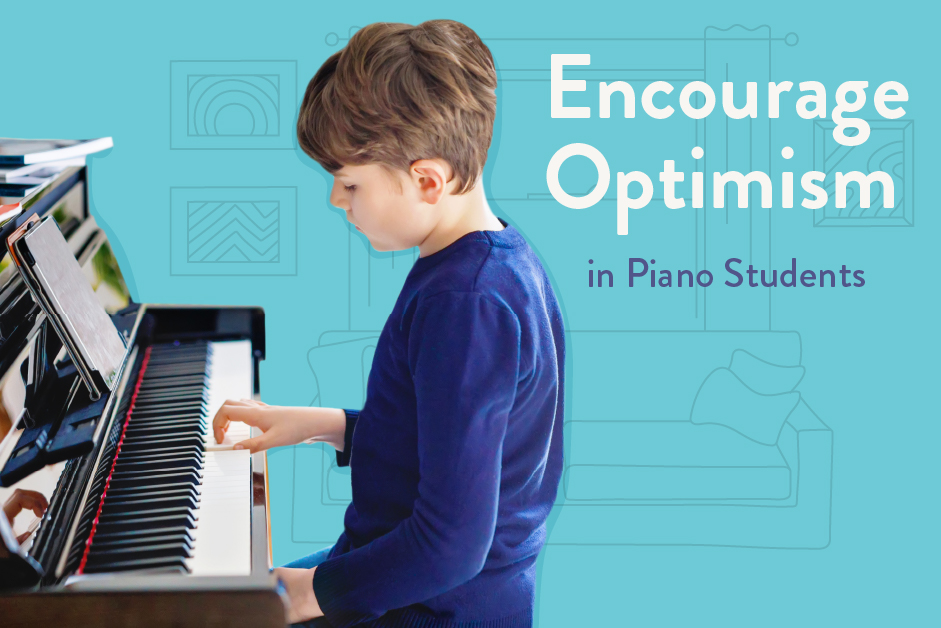With a big piano recital right around the corner, my son is struggling with a difficult passage in his performance piece. After he fails for the uncounted time, he bangs on the keys and shouts, “I’m terrible at the piano! I can’t do this! This piece is too hard and I’m never going to be ready.” With those thoughts in his head, he can’t go forward. If those things are all true, what’s the use of practicing any more? I calmly encourage him to take a break and remember that he’s worked hard at learning to play the piano, there’s only a small part of this piece he hasn’t learned yet, and that he will be ready in time. A little later, he comes back to the piano, and after working at it for a while, he’s able to play the part of the piece that seemed so impossible only a short time ago.
Optimism Leads to Success
We’ve all heard or felt something like my son’s pessimistic outburst. For many of us, feelings like that are fleeting, and we can quickly recover a more optimistic attitude. Others, however, respond to problems with persistent pessimism. They tell themselves that the bad situation they’re in will last forever, it’s all their fault, and there’s nothing that can be done about it. It matters whether you meet challenges with optimism or pessimism. People who hold optimistic views of challenges decrease their risk of depression, accomplish more, and even enjoy better health. When it comes to learning the piano, an optimistic view can make all the difference between having a good experience and wanting to quit. The good news is, responding to setbacks with optimism can be learned.
Corral the Negative
According to Dr. Martin Seligman in his book “The Optimistic Child,” people with a pessimistic view believe their problems are permanent, pervasive, and personal. My son was having difficulty mastering a few measures of his piece, but he pessimistically stated he was “terrible at the piano” (pervasive), “I can’t do this” (personal), and “I’m never going to be ready” (permanent). Pessimism makes your problems seem huge, never-ending, and all your fault. Instead, cut your problems down to size by realizing that they are temporary, specific, and will change with effort.
Celebrate the Positive
Tackling each problem with an optimistic attitude takes practice. When learning the piano, of course you’ll come up against challenges. If you get to a point where you feel stuck, try this:
-
- First, remember the obstacle is temporary. You’ve come across setbacks in the past, and with time you overcame them. Think of how much you’ve learned since you began. Whatever you’re having a hard time with now, you can learn to overcome it!
- Second, think of the problem very specifically. Are you having a hard time getting the rhythm in one section of a piece? Don’t tell yourself you’re really bad at rhythm in general. Tell yourself that you’re having a hard time with this rhythm in this one section.
- Third, believe that whatever you’re having a hard time with, it will get easier with practice.
Teaching Optimism in Children
Parents can do a lot to help their children develop an optimistic attitude. Pay attention to the way you talk about your problems. Also, notice the way you coach your children through the setbacks that they encounter. If you’re optimistic, your children will absorb an optimistic mode of thinking. If you tend to think pessimistically, you can change. It will take some effort, but practice following these steps every time you encounter a problem.
-
- Catch negative thoughts. Many times pessimists don’t even realize they’re thinking pessimistically. Learn to recognize when your thoughts are making your problems pervasive, personal, and permanent. For example, if you make a mistake at a piano recital, notice if it makes you start thinking you’re a terrible piano player.
- Evaluate your thoughts. If you make a mistake at a piano recital, does that really mean you’re a terrible piano player? Really?
- Generate more accurate explanations. If you make a mistake at a piano recital, you made a mistake. Maybe you could have practiced more, or maybe you were nervous. Either way, you’ll do better next time.
- Decatastrophize the problem. When something bad happens, don’t let it become a catastrophe in your mind. If you make a mistake at a piano recital, so what? You made a mistake. Making mistakes is a part of the learning process and is to be expected.
Think about what would happen if you really believed that making a mistake at a piano recital meant you’re a terrible pianist and you’ll never be any good. Would you feel like practicing your hardest anymore? Probably not. On the other hand, what if you believed that making a mistake was a normal part of learning. You’d probably practice hard and look forward to a chance to do better. Remember, as you’re trying to teach optimism to your children, you don’t need to be falsely positive. Instead, guide them to think of mistakes or problems as temporary and specific, and as things they can overcome with effort.
Meet Challenges with Optimism in Piano Studies and in Life
Learning the piano comes with its fair share of challenges. Meet those challenges with optimism, and you’ll overcome them sooner and feel happier along the way. Learn to be optimistic about learning the piano, and take that attitude with you in everything you do in life. To learn more about developing optimism in your child, read “Optimism is a Learnable Skill” by Lorea Martinez on Edutopia.




